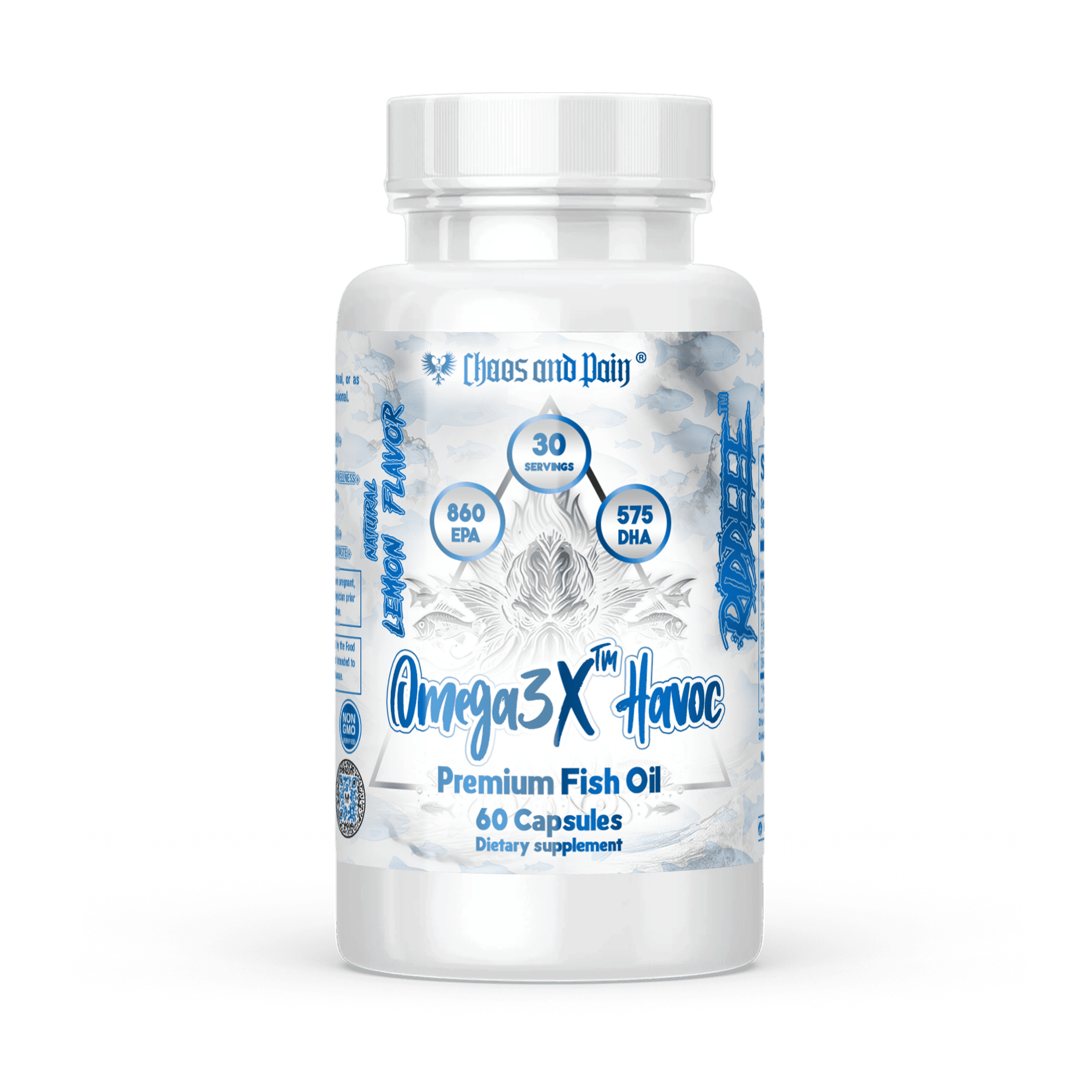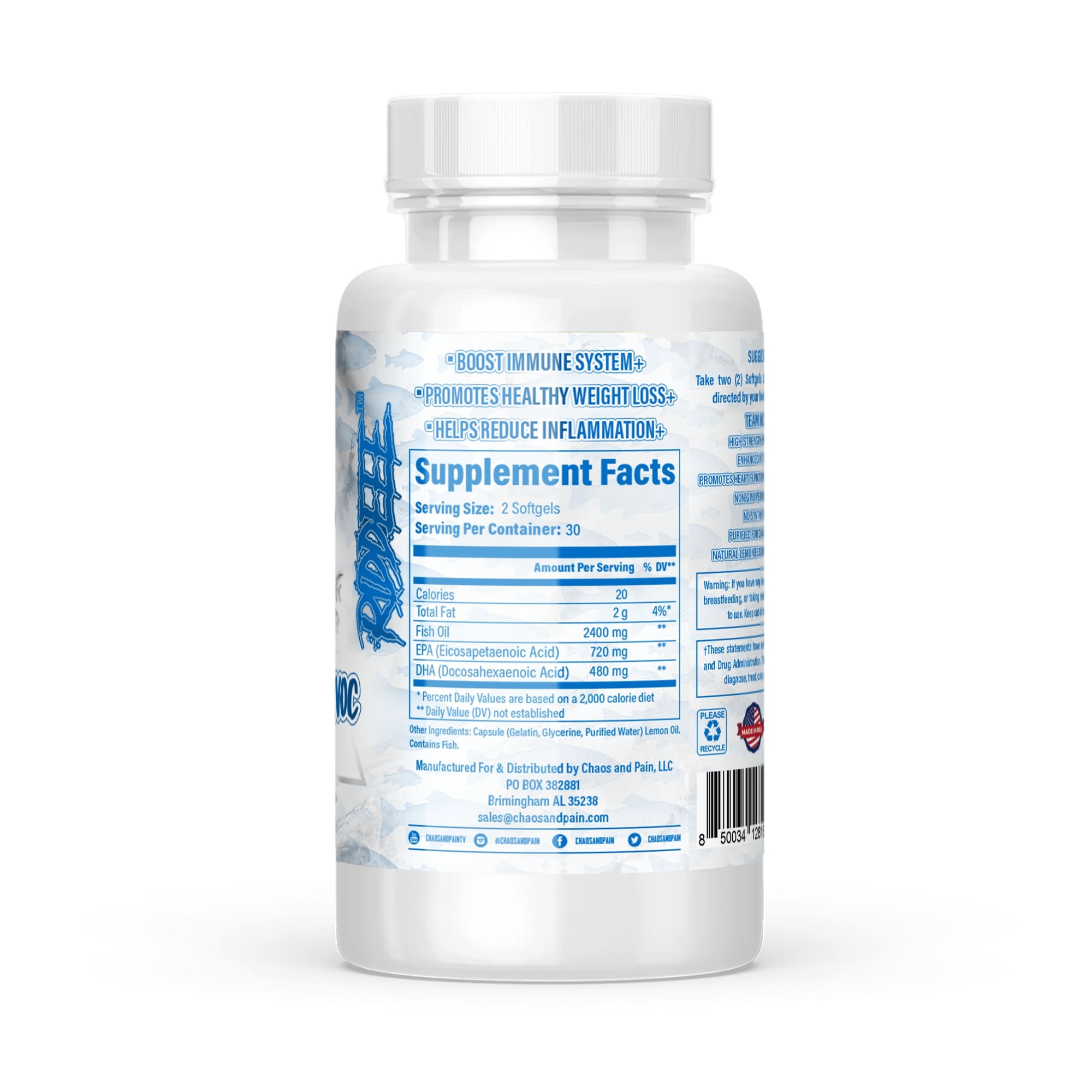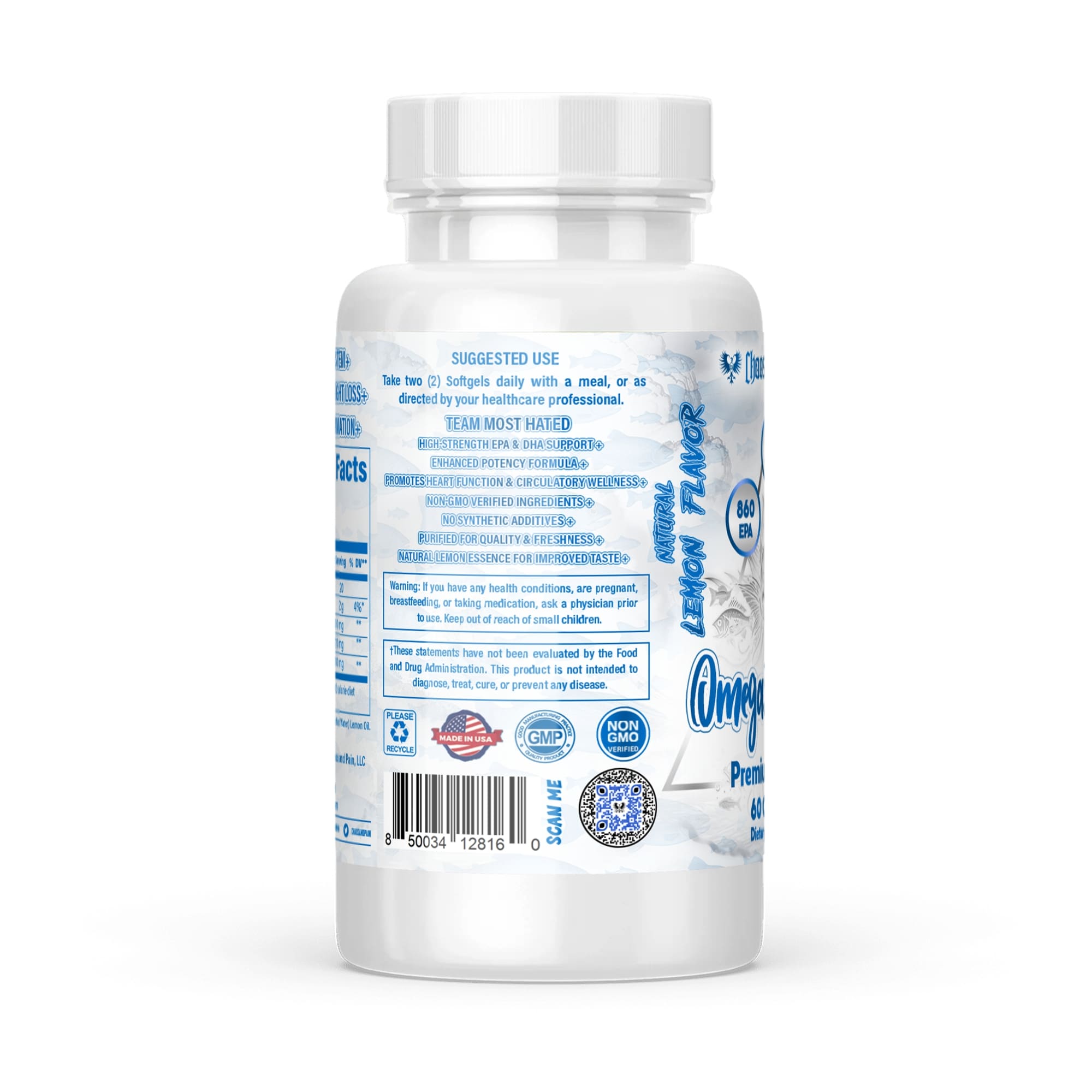Omega3X Havoc - Premium Fish Oil
We are bringing the straight heat with Omega3X Havoc - Premium Fish Oil, a precision-formulated omega-3 supplement built for serious daily demands. This isn’t your generic grocery store fish oil.
Omega3X Havoc delivers 2,400 mg of Fish Oil per serving, stacked with 720 mg of EPA and 480 mg of DHA—a heavy-duty profile designed to support recovery, focus, and overall daily resilience. Whether you're hammering the iron or locked into the grind, Omega3X Havoc supplies your system with the essential fats needed to fuel both brain and body with relentless intensity.+
This formula isn't about promises. It's about support where it counts—internally. From cellular repair to cognitive clarity, Omega3X Havoc reinforces the systems that keep you pushing, moving, and dominating.+
Omega3X Havoc - Premium Fish Oil Highlights
- High-Dose Omega-3s +
- Supports Brain Function +
- Promotes Heart Health +
- Enhances Joint Mobility +
- Fast Recovery Support +
- Clean Absorption Formula +







Understanding Omega3X Havoc – Premium Fish Oil
High-Potency Support for Performance, Recovery, and Cognitive Clarity
Omega3X Havoc isn’t just another fish oil—it’s a precise, high-strength formula engineered for those who demand more from their supplementation. Powered by 2,400 mg of Fish Oil, including 720 mg of EPA and 480 mg of DHA, this product delivers a premium profile of essential fatty acids in each serving. These components are known to support cardiovascular integrity, joint comfort, cognitive performance, and cellular resilience—without overpromising or underdelivering. +
This formula is built to serve the everyday demands of athletes, lifters, and anyone pushing their body and mind beyond average limits. The high EPA content helps support a healthy response to physical stress, while DHA reinforces brain function, visual acuity, and nervous system stability. Together, they create a full-spectrum omega-3 weapon designed to fuel both performance and recovery with every dose. +
With Omega3X Havoc, Chaos and Pain® delivers a streamlined, clinically dosed fish oil supplement without fluff—just raw, targeted support for daily health, peak function, and long-term resilience. +
7-Unique Highlights for Omega3X
Delivers 2,400 mg of premium fish oil per serving for full-spectrum omega-3 support +
Contains a potent 720 mg of EPA to help support inflammation response and recovery +
Includes 480 mg of DHA to promote brain health, visual function, and cognitive sharpness +
Designed to reinforce cardiovascular wellness and circulatory performance under daily stress +
Helps maintain joint mobility and cellular resilience for high-intensity training demands +
Supports mental focus and neural stability for those operating under pressure +
Made with high-quality, clean-sourced fish oil to ensure purity, potency, and absorption +
Fish Oil
What It Is
Fish oil is a concentrated source of omega-3 fatty acids extracted from the tissues of oily fish such as mackerel, anchovies, sardines, or salmon. It contains two essential fatty acids—EPA (eicosapentaenoic acid) and DHA (docosahexaenoic acid)—which the body cannot produce in sufficient amounts on its own.+
What It Does
Fish oil delivers the foundational omega-3 fats needed for critical bodily functions. It supports the cardiovascular system, promotes healthy metabolism, contributes to joint comfort, and reinforces the immune response.+
How It Works with EPA and DHA
Fish oil acts as the delivery vehicle for EPA and DHA, allowing them to be absorbed efficiently and put to work in cell membranes, tissues, and organ systems. It’s not just filler—it’s the essential matrix that ensures EPA and DHA are bioavailable and effective.+
Health & Wellbeing Benefits
Taking fish oil regularly has been associated with better heart function, reduced triglyceride levels, improved metabolic health, and support for inflammatory balance. It also contributes to energy levels, immune resilience, and the body’s ability to adapt under stress.+
EPA (Eicosapentaenoic Acid)
What It Is
EPA is a long-chain omega-3 fatty acid and one of the primary active components in fish oil. It's considered crucial for managing the body’s natural inflammatory processes and supporting cardiovascular and joint health.+
What It Does
EPA helps the body regulate inflammation at the cellular level by acting on signaling molecules like prostaglandins and cytokines. This makes it especially beneficial for people who train hard, experience physical strain, or are exposed to daily environmental stressors.+
How It Works with Fish Oil and DHA
EPA partners with DHA to provide both short-term and long-term support—EPA handles acute systemic responses like inflammation, while DHA reinforces structural integrity in the brain and nerves. Fish oil acts as their carrier, ensuring efficient absorption and function.+
Health & Wellbeing Benefits
EPA is often linked to faster recovery from physical activity, reduced joint discomfort, improved heart rhythm stability, and support for a healthy mood. It plays a direct role in helping the body rebound from daily wear and tear, making it essential for maintaining physical performance and emotional stability.+
DHA (Docosahexaenoic Acid)
What It Is
DHA is another long-chain omega-3 fatty acid, and it’s the most abundant omega-3 in the brain and retina. It plays a structural role in nerve membranes, making it essential for long-term neural and visual health. +
What It Does
DHA contributes to the maintenance and repair of brain and nerve tissue. It supports memory, focus, visual sharpness, and the speed of neural communication. It’s also involved in prenatal development and long-term cognitive protection. +
How It Works with EPA and Fish Oil
While EPA handles immediate systemic needs like inflammation, DHA reinforces the framework behind neural and cognitive function. Together, they cover both the performance and resilience spectrum, while fish oil provides the medium that allows both to be absorbed effectively. +
Health & Wellbeing Benefits
DHA is associated with better brain performance, protection against age-related cognitive decline, and support for stress response under mental fatigue. It helps enhance concentration, vision, and long-term nervous system health, especially in individuals under high physical or cognitive demands. +
How They Work Together
Fish oil supplies the foundation; EPA handles immediate needs like inflammation and recovery; DHA supports the brain, eyes, and nervous system. Together, they create a full-spectrum omega-3 system that supports daily vitality, performance, and long-term wellness. +
This triad works on multiple systems—circulatory, cognitive, metabolic, and musculoskeletal—providing both preventative and performance-based support. EPA and DHA balance each other out—one operating on fast-response systems, the other on deep structural health. Fish oil delivers both in a usable, absorbable format. +
Total Benefits to Health and Wellbeing
Supports heart and circulatory health, promoting more efficient oxygen and nutrient delivery.+
Regulates inflammation, especially in response to exercise, injury, or physical strain.+
Enhances brain function, supporting memory, reaction speed, and overall cognition.+
Boosts visual performance, helping preserve eyesight under stress or fatigue.+
Promotes joint and cellular resilience, critical for recovery and mobility.+
Helps stabilize mood and stress response, reinforcing emotional and mental balance.+
Omega3X Havoc is a clean, efficient way to reinforce core systems of health without unnecessary complexity—just potent, purposeful omega-3s that help keep your body moving and mind sharp.+
Also Supports...
Some Other Major Benefits of Omega3X Havoc™
Omega3X Havoc may help support immune system regulation, especially during periods of high physical stress, travel, or environmental strain. This added layer of defense helps keep your recovery consistent and your system ready to perform. +
It may also assist with lipid balance and metabolic health, supporting healthy cholesterol and triglyceride levels when paired with proper nutrition. This makes it a solid option for long-term foundational support. +
Omega-3s can promote skin hydration and cellular elasticity, helping maintain skin integrity under intense training conditions or outdoor exposure. It’s full-body support that goes beyond the basics. +
References
Omega-3 fatty acids and inflammatory processes: from molecules to man. Biochemical Society Transactions, 45(5), 1105–1115. https://doi.org/10.1042/BST20160474
Omega-3 Fatty Acids EPA and DHA: Health Benefits Throughout Life. Advances in Nutrition, 3(1), 1–7. https://doi.org/10.3945/an.111.000893
Omega-3 (n-3) fatty acids for cardiovascular health: An update for 2020. International Journal of Molecular Sciences, 19(12), 4501. https://doi.org/10.3390/ijms19124501
Omega-3 polyunsaturated fatty acids and their health benefits. Annual Review of Food Science and Technology, 9, 345–381. https://doi.org/10.1146/annurev-food-111317-095850
Omega-3 polyunsaturated fatty acids: photoprotective macronutrients. Experimental Dermatology, 20(7), 537–543. https://doi.org/10.1111/j.1600-0625.2011.01279.x
This product has no reviews yet.
